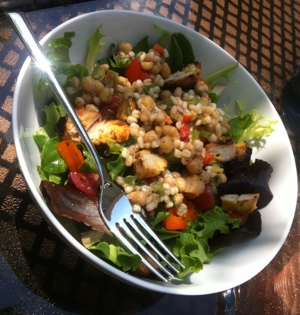Our Blog
Eating a Healthful Diet Lowers Risk of Repeat Heart Attack or Stroke
All to often people rely too heavily on medication alone to treat disease. It has previously been shown that consuming a healthful diet and exercising in addition to taking cholesterol medication can significantly reduce risk of heart disease as compared to taking medication alone. More recently a large study published in the American Heart Association’s medical journal, Circulation, looked at people with an established history of disease and found that those who ate the most healthful diets had a significantly reduced risk of dying from a repeat heart attack or stroke compared with those who consumed the least healthful diets.
Here is a link to an article in the Wall Street Journal covering the study: http://online.wsj.com/article/SB10001424127887323401904578157410574243702.html
The NSG partners with The Fertility Centers of New England
The Nutrition Solution Group is very excited to be joining the team at the Fertility Centers of New England. We will be working hand-in-hand with their fertility team to help clients reach their ideal body weight and nutrition goals to achieve healthy and successful pregnancies.
Being underweight or being obese can contribute to infertility. Women should aim to keep their Body Mass Index (BMI) between 20-24 to maximize fertility.
Being underweight or having very low body fat can make it more difficult to conceive. Women who are underweight may have very low estrogen levels or they may have irregular or absent periods making it harder for them to become pregnant.
Being obese can also make it more challenging to conceive. Assisted reproductive technology procedures like in vitro fertilization (IVF) are not as successful for obese women as they are for women who are at an ideal fertility weight. Furthermore, being overweight or obese during pregnancy can cause complications for you and your baby. Obesity increases risk of miscarriage and stillbirth. It also increases risk of high blood pressure, preeclampsia, as well as gestational diabetes. Finally, excess weight during pregnancy can lead to complications during labor and birth.
Getting to a healthy weight will not only increase the likelihood a woman will become pregnant but it will also increase her chances of having a healthy pregnancy.
Vegetable Garden
I figured it was time for an update on my vegetable garden. My wonderful husband did somehow find the time to build our garden earlier this summer. We used organic soil and planted an array of herbs and vegetables including tomatoes, celery (which I mistook for parsley when I planted it), strike peas, cucumber, green peppers, arugula, dill, chives, cilantro, basil and a mix of lettuces.
This was our first attempt at a vegetable garden and we learned several lessons for next year. The herbs we planted in the vegetable garden did not do well. Perhaps they were planted too closely to the other vegetables and/or they didn’t get enough sun. We will have to do some research before attempting these again next year. We planted basil separately in pots, which is flourishing. The strike peas were by far the best peas that I have ever tasted. Next year we plan to grow several of these pea plants. On the other hand, we will be planting a lot less cucumber (they have huge leaves, they spread everywhere, and they have taken over a good portion of the garden). I may be a bit biased but I feel the arugula and lettuces from our garden have much more flavor than any store-bought variety. We are still waiting on the peppers and tomatoes to ripen. I have my first red tomato but I am waiting a bit to make sure it has fully ripened before I give it a try.
While planting a vegetable garden may not be for everyone it is a great way to keep seasonal vegetables on hand. I’ve gone to the garden several times to pick out a handful of vegetables to add to a salad or include with our meals. Having a garden can also inspire you to try new recipes, especially if you end up with an abundance of certain vegetables. I ended up with a lot of cucumbers and basil so I made Greek salads, Caprese salads, and I hope to make enough pesto to freeze for the winter. Planting a vegetable garden with your children is also a great way to get them to try new foods. It was a fun experiment and I am looking forward to doing it again next year.
Below you can find pictures showing the progress of our garden throughout the summer:
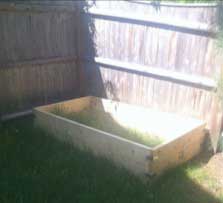
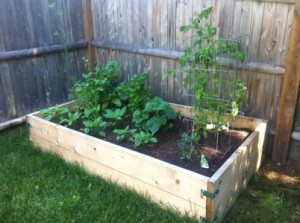
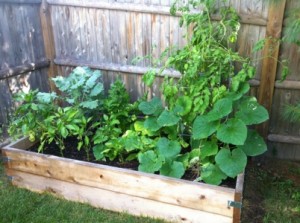
Summer Salads
Now that we are in the summer months and the weather is warmer I tend to make a lot more salads. It is fun to be creative when putting together a salad. Adding beans, nuts, whole grains, fruits, vegetables and cheeses can boost flavor and will provide important nutrients and fiber. With this salad I uses a base of organic mixed greens. I then added left over grilled chicken along with a Tuscan Bean Salad mix and some cut up tomatoes and peppers. For dressing I added a little red wine vinegar, olive oil, salt and pepper. It was delicious and very filling.
Blood Pressure
I just saw a headline in the BBC news stating that about half the people with diabetes in the UK are failing to control their blood pressure, which puts them at greater risk of heart disease, kidney failure, and stroke (http://www.bbc.co.uk/news/health-17626129). People with diabetes often focus on controlling their blood sugar, but it is just as important to maintain a healthy blood pressure. The numbers may look better in the US but I thought it was an important message to highlight. For some people controlling blood pressure can be a matter of lowering their salt (sodium) intake, but only some people are salt-sensitive. For others it is important to make changes to their overall diet, lose weight, and/or exercise more. Ideally blood pressure should be maintained below 120/80 mm Hg. Two key studies conducted by the National Heart, Lung, and Blood Institute revealed that following a diet plan referred to as the Dietary Approaches to Stop Hypertension or DASH diet can help lower blood pressure. The DASH diet can be a healthful diet even for people who do not have high blood pressure.
Veggie Boost
We have been taking advantage of the warm weather at my house by doing more grilling recently. I often take advantage when we are going to be using the grill and make extra vegetables to grill along with whatever else we happen to be cooking. There is something about food that has been cooked on the grill that makes it taste so much better. Grilling vegetables brings out the sweetness in vegetables by helping break down the sugars. This past week I gave my husband a few red and yellow peppers as well as an eggplant that I had sliced and coated lightly with olive oil to grill along with the salmon we were planning to have for dinner. Throughout the week I’ll add the vegetables to my meals. Today I used the grilled peppers and eggplant to make a “Panini”. I added the vegetables to a thin sandwich round along with a slice of mozzarella cheese and a few basil leaves and toasted it in our toaster oven. Later in the week I might dice some of the vegetables up and make an omelet. I also love adding grilled vegetables to salads, pastas, and quinoa. Often I’ll recommend to my clients who are looking to control their carbohydrate or calorie intake to add vegetables to pastas and carbohydrate-rich foods. We tend to be volume eaters and by replacing some of the carbohydrate-rich food with vegetables it makes for a more filling and nutritious meal.
Spoiled Herbs
I hate not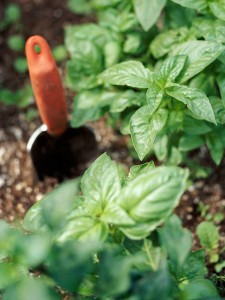 hing worse than opening my refrigerator to a drawer full of rotten herbs. What a waste! I often wish I could just pick out the exact amount of herbs I wanted at the grocery store rather than buying them in a bunch because needless to say I never seem to finish the bunch and I am left with a bunch of expensive spoiled herbs. That is why I love keeping a herb garden during the summer. I have a variety of herbs to choose from at arm’s length all summer long. Even living in a small apartment in Cambridge I kept a small window gardening kit filled with herbs. One of the projects on my husband’s long list of projects to do this year is to build a raised garden in our yard now that we have the space to enjoy it. In the mean time, I found this blog post discussing how to keep basil from spoiling. I plan to try this the next time I purchase basil because right now I have a large bunch of brown basil that I bought earlier this week. http://marcsala.blogspot.com/2007/08/save-basil-tip-to-keep-it-fresh.html
hing worse than opening my refrigerator to a drawer full of rotten herbs. What a waste! I often wish I could just pick out the exact amount of herbs I wanted at the grocery store rather than buying them in a bunch because needless to say I never seem to finish the bunch and I am left with a bunch of expensive spoiled herbs. That is why I love keeping a herb garden during the summer. I have a variety of herbs to choose from at arm’s length all summer long. Even living in a small apartment in Cambridge I kept a small window gardening kit filled with herbs. One of the projects on my husband’s long list of projects to do this year is to build a raised garden in our yard now that we have the space to enjoy it. In the mean time, I found this blog post discussing how to keep basil from spoiling. I plan to try this the next time I purchase basil because right now I have a large bunch of brown basil that I bought earlier this week. http://marcsala.blogspot.com/2007/08/save-basil-tip-to-keep-it-fresh.html
UPDATE
So I went ahead and tried the tips I found in the blog above with my dying basil and it came back to life! I cut the stems of the basil and placed the plant in a glass jar filled with water. I then poked a few holes in a plastic bag and used it to cover the plant and placed the jar on the window sill in my kitchen. I wasn’t able to save the leaves that had browned but the wilted leaves came back to life and I am still using the same basil plant a week and a half later. I will definitely use this tip again the next time I purchase basil.
Poblano-Jalapeno Chili
Chili is one of my favorite home cooked meals. When I saw this recipe on the cover of Cooking Light magazine this month I decided to try it. I thought it was delicious. One of the things I love about making chili is that it freezes well. I always make extra and freeze in single portions that can easily be reheated for a quick lunch or dinner on a busy day. For a little extra protein and calcium substitute plain non-fat greek yogurt for the sour cream. Chili is a good source of protein, iron, and fiber and ground sirloin is low in fat making this a heart-healthy meal.

Check out the recipe here:
http://www.myrecipes.com/recipe/poblano-jalapeno-chili-50400000119691/
The Sleep Diet
In my previous blog I discussed Dr. Brian Wansink’s mindless eating solutions. Well, here is another mindless solution…sleep! I know it is easier said than done but getting a good night of sleep is very important, especially if you are struggling to lose weight. I know that when I don’t sleep well I often feel hungry and crave carbohydrate foods the following day. Here is an interesting article that discusses the subject (http://www.webmd.com/sleep-disorders/guide/lose-weight-while-sleeping).
Another important issue that the article brings up is sleep apnea. Sleep apnea is a disorder where breathing is briefly interrupted or becomes very shallow during sleep. These breathing disturbances typically last between 10 to 20 seconds and can occur up to hundreds of times a night. Signs of sleep apnea may include loud snoring or constantly feeling tired or fatigued despite sleeping long hours. If you think you may have sleep apnea I suggest seeing a sleep specialist. Getting treatment can help you lose weight, and losing weight can help improve your sleep apnea.
The Mindless Solution
Do you eat mindlessly? Most Americans, including me, are guilty of this and it can contribute to overeating and weight gain. Dr. Brian Wansink, director of the Cornell Food and Brand Lab (http://foodpsychology.cornell.edu/), has done a great deal of research on why we eat the things that we do. He wrote the book Mindless Eating: Why We Eat More Than We Think We Do. I remember hearing about some of his research when I was in graduate school and it has really stuck with me. You can listen to him talk about some of his research on his website (http://www.mindlesseating.org/) where he aptly says, “The best diet is the diet you don’t know you are on.” He discusses mindless solutions to help you eat well.
Some of his tips include:
- Replace larger bowls and plates with smaller ones to reduce the amount of food you eat. People serve themselves 25-35% more food when using a larger plate.
- Use tall thin glasses rather than short wide glasses to reduce the amount of beverage you consume.
- Avoid eating family-style. Instead put what you are going to eat on your plate and leave the extras in the kitchen out of arms reach. If you have to get up from the table to serve yourself more you are less likely to do so.
- Don’t eat snacks out of the bag/container. Again, serve yourself a portion and put the rest back in the pantry/freezer/refrigerator.
- Keep distractions to a minimum. We tend to eat more if we are watching television, driving our car, or talking to friends.
- Keep food out of sight or at least out of reach. Visibility and convenience are the biggest factors in eating.
- Be aware we eat more when we are presented with more variety so limit the buffets if possible.
- If trying to get your family/household to try a new food give it a great description. According to Dr. Wansink a detailed description of your food increases your expectations and will make any food taste better.




